UN Rapporteur Reveals Details Of Iran Human Rights Probe

The UN Special Rapporteur on Iran says the mandate of UN fact-finding mission goes beyond Iran’s human rights violations during 2022 protests crackdown.

The UN Special Rapporteur on Iran says the mandate of UN fact-finding mission goes beyond Iran’s human rights violations during 2022 protests crackdown.
In an interview with Iran International, Javaid Rehman revealed that one aspect of the UN's ongoing mission involves looking into the 1980s mass execution of political prisoners as well as minorities' rights.
He said the investigation is not limited to the regime's atrocities committed in the aftermath of Mahsa Amini's death last year that sparked a months-long uprising.
Human Rights Council established a fact-finding mission to investigate alleged violations of human rights in Iran following the mass protests that began in September 2022.
Rehman, in Australia for the first time as UN Special Rapporteur, said Iranian civil societies and dissidents have expressed concerns about the Iranian regime's behavior.Most notably, dissidents are concerned about the possibility that the regime might spy on them and “get revenge” on their families, particularly after taking part in solidarity protests in Australia.
Other countries share the same concern. Global News reported this month that Iranian dissidents in Canada live in fear of imminent harm from agents of the Islamic Republic.
However, Kazem Gharibabadi, the deputy head of the judiciary’s Human Rights Council, said last week that the regime does not recognize the UN’s committee that investigates alleged human rights violations in Iran.
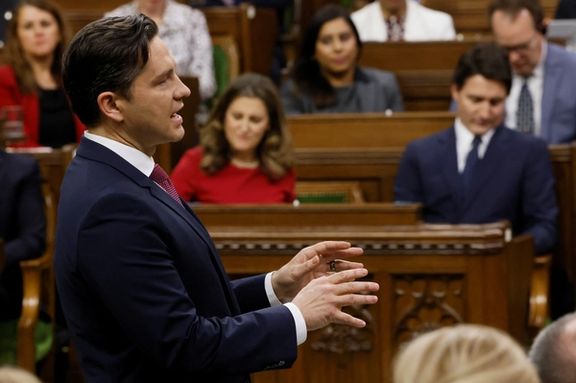
The Canadian opposition leader, running to be the next prime minister, says Iran’s Revolutionary Guards pose the most significant security threat to his country.
Pierre Poilievre, the leader of Canada's Conservative Party, made the remarks on Thursday during a visit to a synagogue in Toronto, outlining his party’s plan for addressing acts of hate crime as well as terrorism and foreign-influence threats.
Dubbing the Islamic Revolutionary Guard Corps (IRGC) as the “most sophisticated, well-financed terror group on Planet Earth,” Poilievre said that the group was behind the October 7 Hamas attack on Israel, and is an ally of Hezbollah, which has been designated in Canada as a terrorist group.
He also cited a recent report as saying that 700 IRGC agents are operating in Canada “with impunity using stolen money, terrorizing the Persian and Jewish populations and putting Canadians at risk on our soil” as well as being involved in financial malfeasance. A Global News investigation earlier in November claimed it has found evidence that Canada has become a safe haven for affiliates of the Islamic Republic, with 700 people identified already and counting.
“It is time that Justin Trudeau stood up to defend our people against these IRGC murderers and terrorists by banning them today. We should work to kick out every single regime, agent, or terrorist that is operating in this country," Poilievre stated.
He also highlighted the 2020 shooting down of a Ukrainian passenger jet by the IRGC, killing 176 people, including 55 Canadian citizens and 30 permanent residents. Flight PS752 was shot down by two air-defense missiles fired by the IRGC shortly after taking off from Tehran's Imam Khomeini International Airport on January 8, 2020.
During his speech, Poilievre presented the Conservative Party's five-point "common sense action plan” to protect citizens from hate-driven crimes, with the primary proposal urging the Canadian government to immediately designate the IRGC as a terrorist organization.
Canada’s federal government has referred to the IRGC as a terrorist organization, described its leadership as terrorists, announced measures to make its senior members inadmissible to Canada, and has listed the outfit’s extraterritorial expeditionary division Quds Force as a terrorist entity. However, despite numerous calls from the federal Conservative party, activists and even US lawmakers as well as the families of victims of the Ukrainian flight, the government has refused to designate the whole entity as a terrorist entity under the country’s Criminal Code. In June, Canada's Senate passed a non-binding motion to designate the the Guards as a terror organization, echoing a similar motion in 2018. The country's Liberals supported the Tory motion in the House of Commons back in 2018, but have not done so since.
Additionally, part of Poilievre's plans involves pushing for the establishment of a centralized hub to register information on individuals collaborating with menacing states and disclosing such details to the public. “We need to establish a Foreign Influence Registry... which requires that anyone who works for a foreign dictatorship register, have their names publicized, and exposed.”
The proposed measures reflect a robust stance by the Conservative Party against the perils posed by the IRGC in Canada, with Poilievre asserting the need for decisive actions to safeguard national security and citizens from potential harm.
Earlier in November, Trudeau reiterated that Canada holds “the Iranian regime responsible for the shooting down of PS752, killing of its own citizens and killing of Canadian citizens, and its sponsorship of terror around the world.” So far, Canada has sanctioned 170 Iranian individuals and 192 Iranian entities, including key IRGC and members of the regime’s security, intelligence and economic apparatuses. In 2012, Canada designated Iran as a state supporter of terrorism under the State Immunity Act.
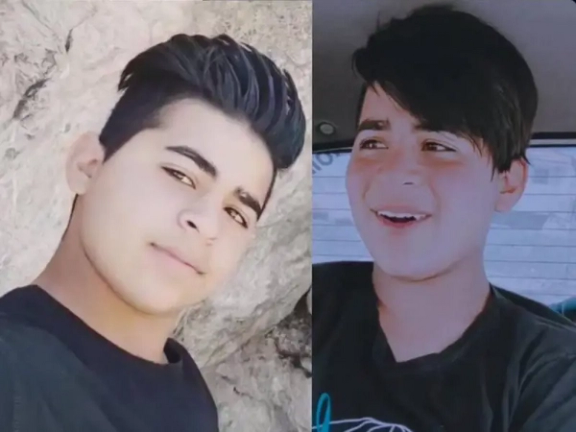
Iran International has obtained information that a prisoner hanged on Friday for murder in Sabzevar prison was under the age of 18 at the time of the crime, arrest, and execution.
Hamidreza Azari was born on August 11, 2006. According to a source close to Azari's family, he was executed at dawn in the northeastern city of Sabzevar and his body has not yet been given to the family.
Iran's Mizan News Agency, affiliated with the judiciary, did not mention the person's identity or age in its report on the execution. However, the outlet made a narrative around the victim’s identity and called him a “martyr” while using his image to emphasize the Islamic Republic's tough policies regarding hijab.
A person under 18 at the time of the alleged crime can't be executed under international death penalty laws. But juveniles are executed in Iran, one of the few countries in the world that do so.
The execution is the second hanging that has been publicly announced in Iran in the last two days.
According to Human Rights Activists News Agency (HRANA), the number of executions committed by the regime in 2022 increased by over 88 percent from the previous year.
Iran executes more people each year than any other nation except China, according to Amnesty International.
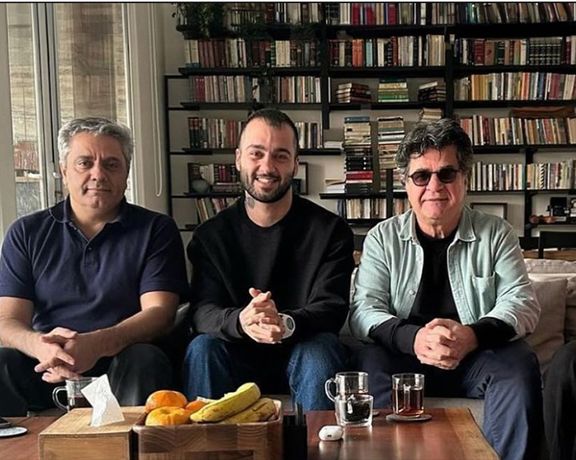
Prominent filmmakers Jafar Panahi and Mohammad Rasoulof met Iranian rapper Toomaj Salehi after his release from prison over supporting anti-government protests.
Prominent filmmakers Jafar Panahi and Mohammad Rasoulof met Iranian rapper Toomaj Salehi after his release from prison over supporting anti-government protests.
The 33-year-old rapper is known for his protest songs directly criticizing the Iranian regime. He was arrested in October 2022 amid an intensified crackdown by the Islamic Republic on opposition figures, following the nationwide Woman, Life, Freedom protests, ignited by the death in custody of Mahsa Amini.
After a year in prison, including 252 days in solitary confinement, Toomaj Salehi was released on bail on November 19.The award-winning filmmakers have also been free on bail since February.
Panahi was imprisoned early in July 2022 following a visit to the Evin prison to inquire about the whereabouts of Rasoulof, who was arrested the previous day.
Prior to the "Woman, Life, Freedom" protests, Rasoulof was imprisoned after signing a petition calling for the Iranian security forces to cease their violent attacks on demonstrators in Abadan, southwest Iran.
Last spring, hundreds of residents of Abadan, the capital of Khuzestan in the southwest of Iran, took to the streets to protest the fatal collapse of an unfinished building. Their demands included the prosecution of those responsible for the accident, including the mayor and members of the city council.
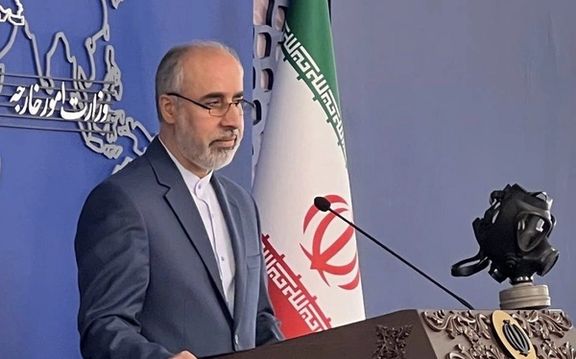
Iran’s Foreign Ministry spokesman has condemned the European Parliament's resolution on human rights breaches in Iran, calling it “meddlesome” and "anti-Iranian".
Nasser Kanaani, in a statement released on Friday, said the resolution approved by the European Parliament reveals “the confusion of some European parties regarding the reality of the Islamic Republic.”
European Parliamentarians adopted a resolution condemning the deterioration of human rights in Iran on Thursday.
As part of the resolution, European Parliament members called on the Iranian authorities to end immediately all discrimination against women and girls, including mandatory veiling, and to retract all laws discriminating against women and girls
The European Parliament members (MEPs) also urged the regime to release “victims of arbitrary detention and human rights defenders” such as Narges Mohammadi, Sepideh Gholian, Golrokh Iraee, Nasrin Javadi and Bahareh Hedayat.
Moreover, their demands included the immediate release of Iranians with dual citizenship and non-Iranians, such as Johan Floderus, Ahmadreza Djalali, Nahid Taghavi, Jamshid Sharmahd, and Massoud Mossaheb.
Finally, the resolution echoed the calls to designate the Islamic Revolutionary Guard Corps (IRGC) as a terrorist organization and to sanction the President, the Supreme Leader and the Prosecutor-General for their human rights violations.
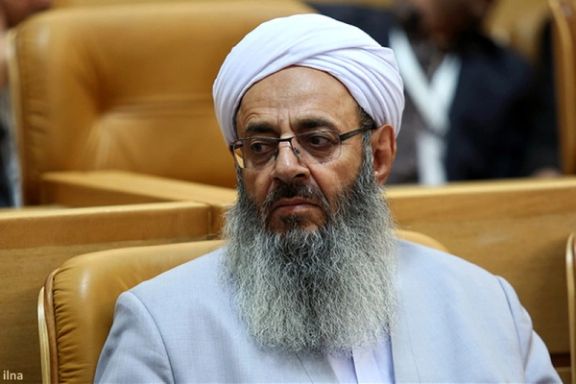
Outspoken Iranian Sunni leader Mowlavi Abdolhamid has stated that regime forces have shut down a number of Sunni prayer rooms in Mashhad and Tehran.
In a sermon delivered at the Friday prayer service in the Sunni-majority city of Zahedan in the southeast, Abdolhamid said the prayer rooms were "trouble-free", and "nothing was said against" the Shiite clerical government.
Since Mahsa Amini's death in mid-September 2022 and the nationwide uprising that followed, Zahedan has become the epicenter of protests against the Islamic Republic.
In recent weeks, tensions have increased between the Sunni Baluch minority in the region and Islamic Republic authorities.
As reported last week, security and law enforcement forces and "armored bulletproof military vehicles” were deployed at some crossing points in the Sistan-Baluchistan province before the weekly Friday sermon of Mowlavi Abdolhamid.
Currently, Iranian authorities are being criticized for failing to punish those responsible for Zahedan's 'Bloody Friday' on September 30, 2022, when security forces fired at protesters.
It is estimated that nearly 100 civilians, including women and children, were killed in Zahedan, the capital of Sistan-Baluchistan province, when they peacefully protested against the government.